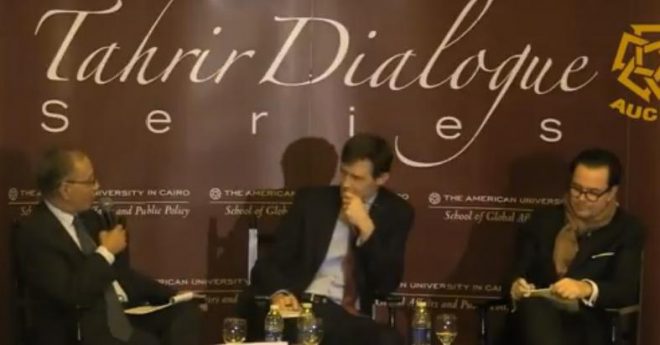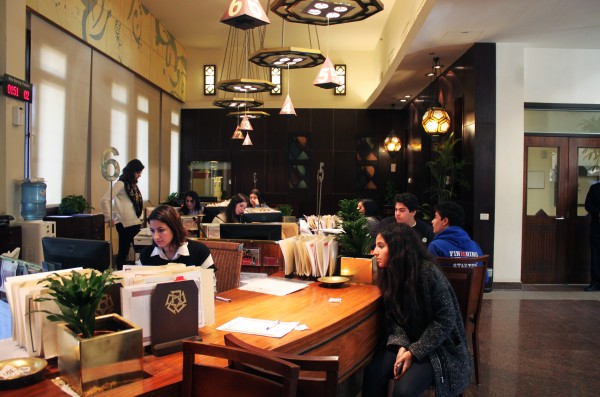Euro-skepticism is Growing, Top Diplomats Say
By Eryn Amodeo
Follow @amodeo_eryn

Both Britain and France have a very strong sense of national identity which neither country has any intent of giving up within the European Union, but both have enjoyed a tight-knit bond for more than a century.
Last week, moderator and director of the Center for Migration and Refugee Studies in the School of Global Affairs and Public Policy Ibrahim Awad spoke with UK and French Ambassadors to Egypt John Casson and Stephane Romatet, respectively, about the future of Europe in a panel-style discussion.
During the discussion, which was sponsored by the School of Global Affairs and Public Policy as part of its ongoing Tahrir Dialogues, the two diplomats highlighted France and Britain’s alliance in regards to the controversial Israeli/Palestinian conflict, the War on Terror, as well as “Brexit”.
They also discussed the EU’s future relations with the Middle East and North Africa (MENA) region.
Europe has faced a number of challenges stemming from conflict and crises in MENA, the ambassadors said.
The European Union has accepted over two million refugees in the past two years, which raises various questions surrounding the political-economic gap between North/South and East/West societies.
The panel discussion was geared towards addressing the migrants from the MENA region as well as how this affects globalization.
Casson and Romatet also discussed the fears many Europeans face today.
“There is much skepticism in European defense especially considering the crisis in European nation-states and societies in regards to welfare. Given the significant rise of populists from both left and right-wing parties, some nation-states have been forced to squeeze between the parameters of EU level political requirements. Which as you can imagine, is un-addressing of the people’s needs,” Romatet said.
The challenges are further exacerbated by the fact that the United States under President Donald Trump has withdrawn from a number of international accords and appears to be isolating itself.
Because of the global threat of terrorism, there is a growing European consensus for a re-investment in the defense-sector.
“This question remains on the forefront of European policies: is the pending defense mechanism one that each country in The EU approach on an individual basis or do they pool with other societies in order to strengthen defenses?” Romatet said.
In regards to UK’s political climate, British ambassador Casson stressed the importance of “identity and political institutions” in this time when Europe’s reputation is gaining “melting-pot” status.
Casson refers to the illegitimate “racist” coin in light of “Euro-skepticism.”
“Racism isn’t discussed in mainstream British politics whereas Euro-skepticism is based on the momentous credibility it has gained of late,” he said.
“If we merge the two terms together this does a disservice to the fundamentals of euro-skeptic thinking, as it’s unrelated to racism,” Casson added.
The empirical power that Europe (and especially Britain) has held over the Middle East throughout history cultivates a suggestive agenda that perhaps borders racist principles.
Although Casson claims the two remain separate by nature, euro-skeptic thought is perceived to criticize the rejection of migrant integration, a direct mirror of the implicit segregation that encompasses racist ideals.
With a brighter future in mind, Britain feels it “imperative to take responsibility in defending [themselves] by establishing close bilateral-cooperation.”
“The NATO agreement ensures that we must stand together bound by treaty. NATO remains a large part of the British national Image, securing a globally recognized status in Britain through economic engagement,” Casson said.
The Jerusalem Quotient
In the same vein of treaty-agreements, the British readily disagree with Trump’s recent claim that Jerusalem is Israel’s capital. They recognize that Jerusalem remains occupied by Israeli territory – a concrete reality of the Palestinian disposition.
Earlier in the week, both the UK and France – permanent Security Council members – voted in favor of a resolution calling on the US to rescind its recent Jerusalem announcement.
The US vetoed the resolution and it did not pass.
While both Europe and the Middle East have their nation’s best interest at heart, the paramount concern becomes how to achieve peace.
In light of Trump’s recent claim, many around the world feel the US has lost the mediator role as the “honest broker” in the Israeli/Palestinian conflict.
“Trump’s decision is absolutely regretful – France disagrees and we have no plan of moving our Israeli embassy,” Romatet said.
The British outlook is complementary to that of the French, further exemplifying the ongoing and strengthening ties between their allied democracies.
Casson believes that the only solution to the 70-year conflict is to establish a Palestinian state on Palestinian ground through negotiations and peace treaties.
“Europe cannot become the broker-role that [former US President Bill] Clinton once played in the Israeli conflict. We must find ways in groups of countries to forge greater census and get more substantial things done. No more sitting around!”


